Dental Implants – Houston, TX
Restoring a Functional and Beautiful Smile
Don’t worry – you don’t have to travel across town for your dental implant surgery. At Hiner Family Dentistry, we offer comprehensive, in-house dental implant placement and restoration services from start to finish. Our goal is to keep you comfortably situated in one convenient location for the entire process of replacing your missing teeth. Rest assured that you'll receive consistent and reliable care from familiar faces you trust. We’ll be by your side throughout the entire journey, ensuring your comfort before, during, and after the dental implant placement. To find out if you're a good candidate for dental implants, give us a call to schedule a consultation.
Why Choose Hiner Family Dentistry for Dental Implants?
- Start-to-Finish Dental Implant Treatment
- Cone Beam Imaging for Accurate Treatment Planning
- Multiple Financing Options Available
What Are Dental Implants?
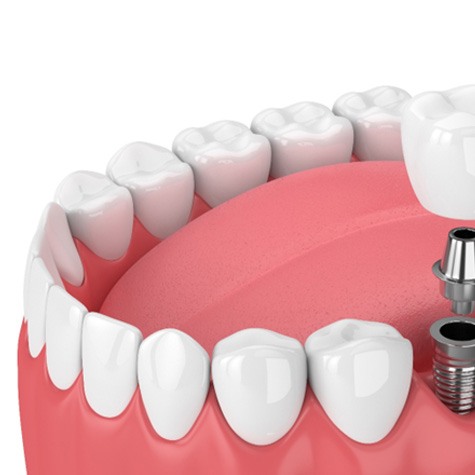
Unlike other tooth replacement options that only address the visible crown above the gumline, dental implants are titanium posts that restore teeth from the roots up. These posts are strategically placed within the jawbone, where they gradually fuse over several months, creating a durable foundation for custom-made restorations.
Dental implants stand out as a versatile solution for addressing tooth loss, capable of replacing a single missing tooth or an entire arch as needed. Known for their longevity, dental implants can easily last for decades or even a lifetime.
The 4-Step Dental Implant Process
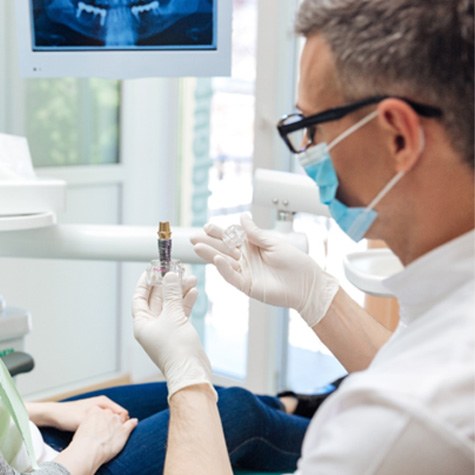
Getting dental implants requires a unique, multi-step process that spans several months. This may seem like a long time, but the long-term benefits you will experience are well worth the wait! At Hiner Family Dentistry, we are proud to complete the entire dental implant process in our office. This way, you won’t have to work with an outside specialist at another location. Every patient’s treatment looks a little bit different, but here are the four main steps you can expect.
Initial Dental Implant Consultation

Your dentist will go over your oral health and medical history to see if you are a good candidate. If necessary, we will work with you to complete preliminary procedures, like gum disease therapy, tooth extractions, and bone grafting. Then, we can move on to planning the rest of your dental implant treatment. During your consultation, we will go over the step-by-step process, including the timeline and the cost.
Dental Implant Surgery

We complete the entire dental implant process at our practice. First, we will begin by numbing the area with a local anesthetic. Then, an incision is made into the gum tissue so we can carefully potion each implant. We will then close the tissue and place healing caps over the designated areas to ensure a proper recovery.
Dental Implant Osseointegration & Abutment Placement
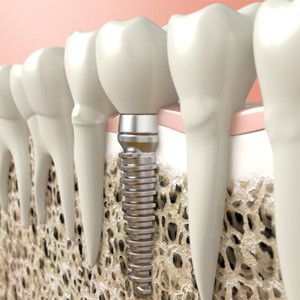
After the procedure, you will go home to rest. Osseointegration must take place over the next few months. This is when the titanium implant fuses to the jawbone. This is what makes the implants so stable and successful. Your final restoration will then be crafted from the impressions taken of your mouth.
Delivery of Dental Implant Restorations

Lastly, you will return to our dental practice to have your restoration placed. This will be a dental crown, bridge, or denture depending on how many teeth you are replacing. We will check to ensure that your bite is comfortable and then you will be ready to enjoy your newly rebuilt smile!
The Benefits of Dental Implants

When comparing dental implants to alternative tooth replacement options, like dental bridges or dentures, you’ll learn why implants are the preferred choice among dentists and patients. Here are just some of the ways that dental implants can improve the quality of your life.
Day-to-Day Benefits

Once your gums and jawbone have completely healed, your dental implants shouldn’t feel any different from your natural teeth. You might even forget that it is there! Here are some of the ways that you can benefit from dental implants every day.
- Easy to Maintain: There isn’t a particular way that you need to care for your dental implants. You should just continue to complete all of the same best practices you do for your natural teeth. Brush twice, floss, and rinse with mouthwash every day. You should also continue to attend regular cleanings and checkups.
- Strong Bite: Dental implants have the ability to restore your bite force up to 90%. This is much more than you can expect with traditional bridges and dentures.
- Increased Confidence: If you have gaps in your smile, it is easy to feel self-conscious. With dental implants, you can continue to show off your smile with pride.
Health Benefits

Dental implants have a positive impact on your health. Here are some ways dental implants can benefit your entire body.
- Improved Dental Health: Missing teeth increases the risk of other dental issues, including gum disease misalignment, and additional tooth loss. Dental implants help to prevent these negative effects.
- Better General Health: Dental health and general health go hand-in-hand. When your smile is healthy, you are at a lower risk of several life-threatening conditions, like diabetes and heart disease.
- Prevents Bone Loss: When your jawbone isn’t being stimulated by regular chewing, it starts to be reabsorbed by the body. Since dental implants replace the roots of the missing teeth, they stimulate the jawbone and prevent bone loss.
Long-Term Benefits

Dental implants cost more than traditional dentures and dental bridges, but it makes perfect sense why. Dental implants are an investment in the future of your smile. Here are some of the benefits that you can experience for many decades to come.
- Long-Lasting: Dental implants are made to last for several decades or even the rest of your life. You might never have to worry about your missing teeth again.
- Successful: Dental implants have an incredible success rate of over 95%. It is very unlikely that your dental implants will fail.
- Save Money: Dental implants have a higher upfront cost, but they are made to last for a very long time. You won’t need to worry about frequent repairs and replacements, and you don’t need to stock up on adhesives and soaking solutions. Implants can even prevent costly oral health issues from arising. You could end up saving a lot of money in the long run.
Who Dental Implants Can Help
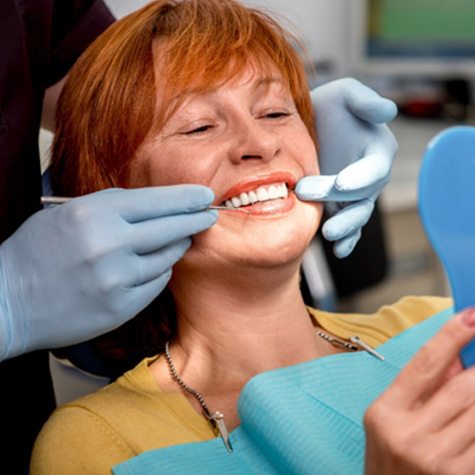
Patients experiencing tooth loss can enjoy a fulfilling life with dental implants. While some may qualify for immediate dental implant surgery, others may need preliminary treatments like bone grafting, gum disease treatment, or extraction. Regardless of the recommended path, you can look forward to a full and permanent smile in the future. The best part? Dental implants can restore any number of missing teeth.
Missing Single Tooth
For a single missing tooth, you may simply need one dental implant. We'll insert a titanium post into the jawbone, attach a metal abutment to connect the restoration and top it off with a custom dental crown.
Missing Multiple Teeth
Rather than depending on fixed bridges with abutment teeth as anchors, we opt for a more effective approach. By inserting two dental implant posts into the exterior sockets and allowing them to fuse with the bone tissues, we can attach metal abutments and an implant bridge to seamlessly fill the gaps in your smile.
Missing All Teeth
With two to six dental implants, we can attach a personalized implant denture to fully restore an entire arch of teeth. This ensures a natural-looking and functional smile, allowing you to enjoy your favorite foods, smile confidently, and speak with ease.
Understanding the Cost of Dental Implants

Keep in mind that the exact cost of dental implant treatment can only be determined after scheduling a consultation with our team. After a thorough assessment of your oral health, overall well-being, and jawbone density, we can provide an accurate estimate of the total cost, allowing you to properly budget for the financial obligations that come with achieving a fully restored smile.
Dental Implant Technology
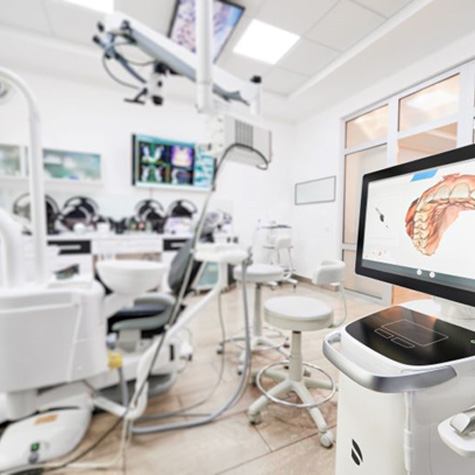
The skill and experience of the dentists at Hiner Family Dentistry are of critical importance in helping patients to enjoy successful dental implant treatment. However, we could not serve our patients as well as we do without the assistance of some state-of-the-art technology. We utilize a number of advanced tools to make the treatment process as efficient, comfortable, and effective as possible. Would you like to learn a bit about some of the technology in our office? Continue reading below.
3D Cone Beam Imaging/3D CT Scanning

A cone beam computed tomography (CBCT) scanner is an imaging tool that uses the same type of radiation as normal digital X-rays. However, it emits the radiation in a cone-shaped beam. This allows the machine to capture extremely detailed, three-dimensional images of your jawbone, teeth, nerves, and connective tissues.
Our CBCT scanner can serve a few different purposes in the dental implant process:
- It can let us know whether your jawbone is healthy enough to support dental implants.
- It alerts us to any complex or unusual features of your oral anatomy that might have a bearing on your procedure.
- After dental implant placement, it can allow us to monitor how well your implants are bonding with the surrounding jawbone.
- If you ever experience a problem with your implants, the CBCT machine can help us diagnose the issue and design a treatment plan to get your smile back on track.
The CBCT scanning process is fast, painless, and noninvasive.
Guided Dental Implant Surgery
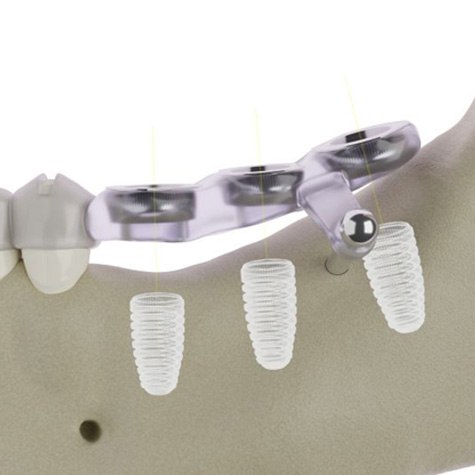
For many years, dentists relied exclusively on freehand dental implant placement. In other words, they had to take an educated guess as to exactly where, how deep, and at what angle to insert implants into a patient’s jawbone. In simple cases, there is nothing wrong with freehand placement. In fact, it is usually successful.
However, if you need multiple implants or have other complicating factors in your case, we may decide to perform guided dental implant surgery. Before your procedure, we will work with a dental lab to create a custom surgical guide. It will allow us to place your new prosthetic tooth roots in the most precise manner possible. As a result, you may experience a reduced chance of dental implant failure, a faster healing process, and other benefits.
Digital Impression System

When we are designing the crown, bridge, or denture that will go on top of your dental implants, we will use our advanced digital impression system. All we have to do is move a wand-like device around your mouth. It will capture thousands of images and assemble them into a three-dimensional representation of your teeth and gums. A dental lab will then be able use that data to fabricate your new teeth.
Many patients love digital impressions because no messy goop is involved. Plus, they are extremely accurate, so retakes are almost never necessary. Their accuracy also ensures that your new teeth will look good and fit comfortably.
Dental Implant FAQs
How Successful Are Dental Implants?
One of the main reasons that dental implants are so celebrated is their startlingly high success rate. When placed by an experienced professional, around 95% of them remain successful after 20 years of use.
Of course, the length of time that you can expect your dental implants to last depends heavily on how well you take care of them, as well as where the implant is located in the mouth and the amount of pressure that it’s under.
Am I Too Young to Get Dental Implants?
Typically, people’s jaws are still developing well into young adulthood. If you get dental implants before the bone has finished growing it, it could either stymie the development of bone tissue or lead to complications for the implant itself.
For this reason, we will usually defer your dental implant surgery until the jawbone has reached full maturity sometime in the mid-20s. It’s worth keeping in mind that this process also tends to take longer for men than for women.
Am I Too Old to Get Dental Implants?
On the other hand, there’s no upper age limit for people to get dental implants. Studies have shown that, all else being equal, seniors have the same rate of dental implant success as do younger people. The more important question is whether you have any outstanding oral health problems that could cause difficulties for the procedure.
Can I Get Dental Implants If I’m Diabetic?
If your diabetes is under control, then the condition shouldn’t necessarily affect your ability to heal after the surgery. Thus, your chances of dental implant success should be comparable to anyone else’s.
However, if your diabetes is not under control and associated with high blood pressure, the success of your dental implants could by affected by an increased risk of infection. For this reason, it’s a good idea for such patients to consult with their endocrinologist or primary care physician about controlling their diabetes before pursuing dental implants.
